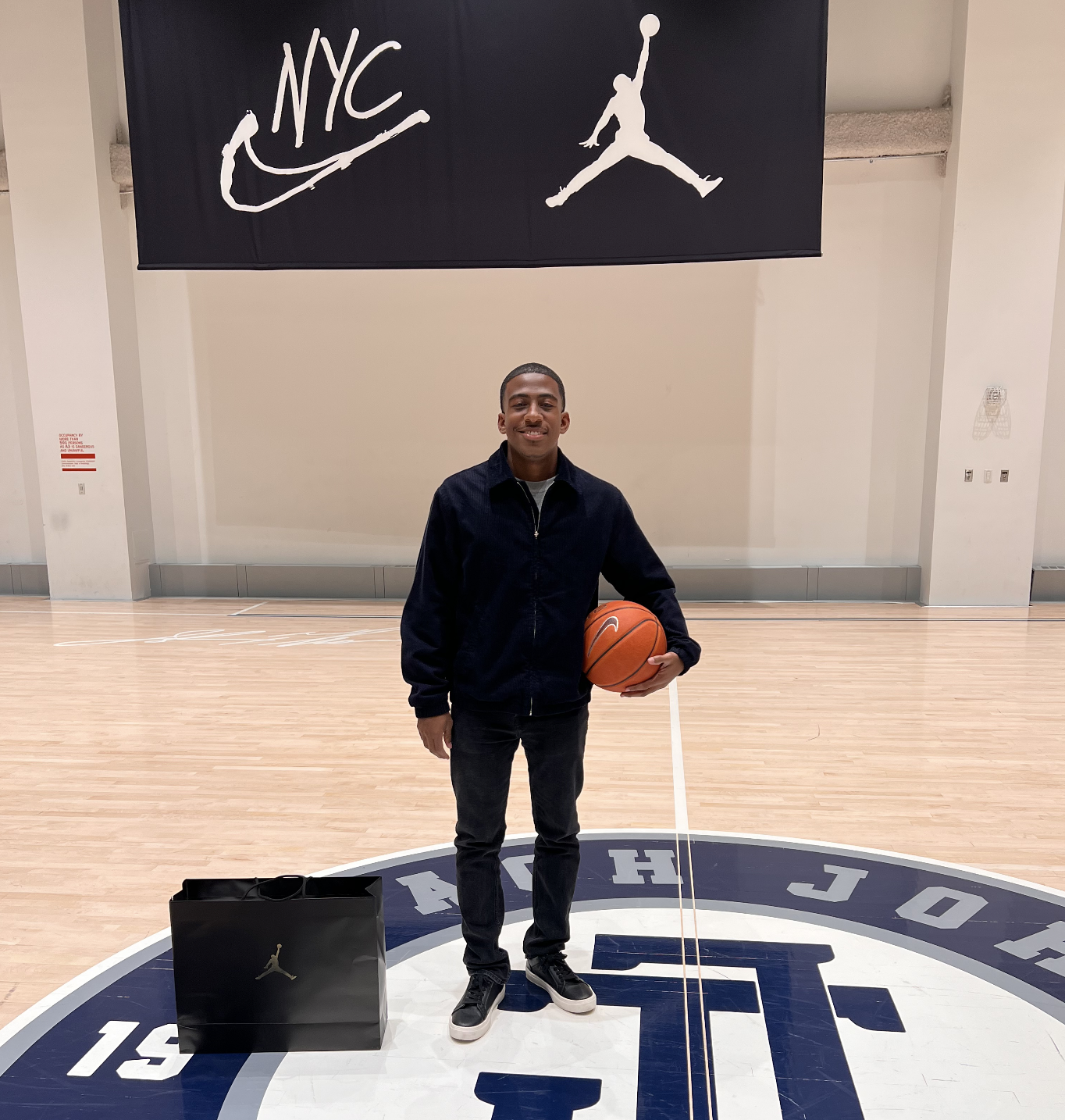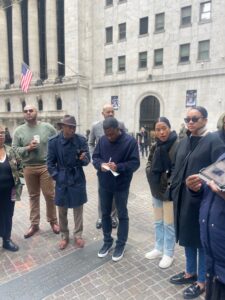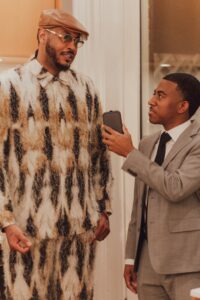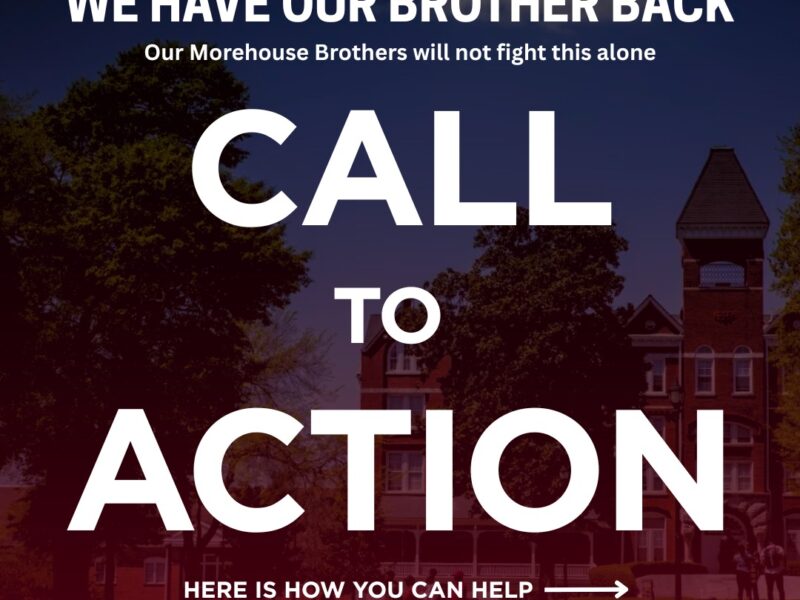Morehouse Alumni Reflects Jordan Brand Experience

By: Miles Johnson, MT Alumni
June 10, 2022 was a day I’ll never forget. I was heading into my senior year at Morehouse College and I received an email notification from Professor Ron Thomas. The Chair of Morehouse’s Journalism in Sports, Culture and Social Justice program. The day had finally come. I became a Michael Jordan Scholar.
Michael Jordan and Jordan Brand pledged a 10-year, $100 million commitment to fight against systemic racism in 2020. His goal was to empower communities across the country with grants to advance their existing racial equity goals for Black people, some of those grants enable scholarships.
This pledge, known as the “Black Community Commitment,” designated Morehouse– the only institution in the world that specializes in graduating black men–as one of the beneficiaries. Jordan’s “Black Community Commitment” is centered around its four core pillars: economic justice, education, narrative change, and social justice.
Michael Jordan and the Jordan Brand, gave a $1 million gift to Morehouse’s Journalism in Sports, Culture and Social Justice program in May 2021. Jordan’s Black Community Commitment donation funded scholarships, technology, and educational programming for students studying journalism and sports-related areas of study.
At the time, I was a sports anchor for the Maroon Tiger, and one of my first assignments was to break the news of this historic scholarship for our social media followers. The video was searingly special to me. It was the first time I was posted on MT’s Instagram page with a post that I anchored and edited by myself.
Link to video: https://www.instagram.com/p/CPjapdQhmvq/?igshid=Y2NkYjk0MDhjYg==
Fast forward to 2023. I graduated from Morehouse last May and received a full tuition scholarship to New York University to pursue a Master of Arts in Journalism.
A few weeks ago, I received a call from Chair Ron Thomas–the man that aided me in getting many of the opportunities in journalism that my alma mater awarded me. He called me about the opportunity to represent Morehouse as a former Michael Jordan scholar at a two-day “Jordan Black Community Commitment Media Experience” in New York City. I immediately said, “Yes.” Even as an alumnus, the Morehouse brotherhood was stronger than ever.
The experience was a culmination of several organizations the Jordan Black Community Commitment has partnered with in the pursuit of narrative change, including The Blackhouse Foundation, BlackStar Projects, ColorCreative, The Ida B. Wells Society, Morehouse College’s Sports, Culture and Social Justice Journalism Department, The Opportunity Agenda and StoryCorps.
Day one started with a phenomenal tour of lower Manhattan by Stacey Toussaint from “Inside Out.” Her tour was an example of how African American history was hidden in plain sight. It was eye-opening.

I never knew about: a local Black community in lower Manhattan, how a chunk of land that the government took away from Black people following the aftermath of the 1712 slave revolt, or the brutal torture my ancestors were under in pursuit of fighting for their freedom. It made me think about all the African American history that was still unknown.
But while we were walking on the tour, Chair Thomas made a distinction that should be the way we look at this. This wasn’t just African American history. This was history, period. The only way we change the way stories are told of past history is by shifting that mindset.
Later that day we took a tour to Nike’s New York headquarters. As a sports guy, I was in heaven. Whether it was putting up shots at the basketball court with Tim Yu, Jordan Brand’s Vice President of Global Communications and Purpose, or staring at the stellar architecture of the building, I was in awe.
But there was something more impactful that awaited us on the sixth floor: a narrative change workshop. It was a much needed conversation about how us as storytellers can help shift the narratives of how stories are told, today. Morehouse professor and Ida B. Wells Society trainer, Nicole Carr, brought up a fantastic point about why changing who the gatekeepers of storytelling are, is the first step in changing the narrative.
Unfortunately, there aren’t enough minorities placed in those decision making positions that can help shift the narrative, that can change the flaws in mainstream media coverage. There are people who are gatekeepers to storytelling in newsrooms that don’t represent or speak to every community; instead they portray and playcate to the masses.
The conversation didn’t end there. Shauncey Mashia, Senior Manager for Jordan’s Black Community Commitment encouraged me to not be shy.
“We want to hear your voice,” she told me. “Your voice matters and we want you to contribute.”
At 22 years old, I was the youngest in the room, filled with media moguls and creatives that were well established in their careers. However, Shauncey was telling me that I wasn’t just a guest; she let me know that I belonged in the room.
The first thing that popped in my mind was our responsibility to tell uncomfortable stories. All of us in the room had a responsibility to inform our communities of what we learned, but most importantly, branch out of the comfortability in our community and teach other people who don’t look like us. Remember, this was not just African American history; this was American history.
In addition, being uncomfortable is essential. Michael Jordan, widely regarded as the greatest basketball player of all time, would have never been the player we know today if he stayed comfortable.
One of Jordan’s most famous games was the “Flu Game.” Although he wasn’t 100%, he willed his team to victory. That’s being uncomfortable. We must take this same mindset that Jordan has to storytelling.
This means to challenge yourself to speak with communities that don’t look like you. Challenge yourself to put your pen to paper to invoke those uncomfortable conversations. When I thought of this, the great Ida B. Wells popped in my mind as someone who unapologetically did her job in shifting the narrative, despite the consequences. She showed why the role of history is so important in narrative change.
Day two was where I saw how much of a family Jordan Brand is. We had a cocktail dinner with even more media creatives, executives from the Jordan Brand, and a couple of Jordan Brand’s signature athletes.
I bonded with media mogul, Ms. Brittany Packnett Cunningham over our shared experiences as Preacher’s Kids, “PK’s,” and how it’s helped us connect with people in journalism.
I spoke with Cliff King, the Director of Sports Marketing at Jordan Brand about my love for my Philadelphia Eagles, and of course, Jalen Hurts.
I interviewed one of the greatest basketball players of all-time, about a few blocks from his stomping grounds in Brooklyn, NY. No other than Jordan’s first signature athlete, Carmelo Anthony.

I engaged in a conversation with Jason Reynolds, a #1 New York Times best-selling author, and Mitchell Jackson, a Pulitzer Prize winner. We discussed our shared connection through my current professor at New York University, who happens to be their mentor, the legendary James McBride.
I was introduced to Melanie Harris, the Vice President and General Manager of Jordan Brand North America. I tried to keep my composure when introducing myself, but she said she already knew who I was. In fact, she was excited to meet me as the name of her son is Miles too. What put the cherry on top of a magical night was when Ms. Harris congratulated me at dinner in front of all of Jordan Brand’s esteemed guests for graduating Morehouse and representing my alma mater with class.
Being part of the inaugural Michael Jordan scholar cohort brought my journey full circle during this reflective Jordan Brand experience. Thank you, to Michael Jordan and Nike’s Jordan Brand for your unwavering adherence in supporting me in my journey to pay it forward, and shift the narrative, like the greats did for me.
Copy Edited by: Auzzy Byrdsell, Editor-in-Chief






